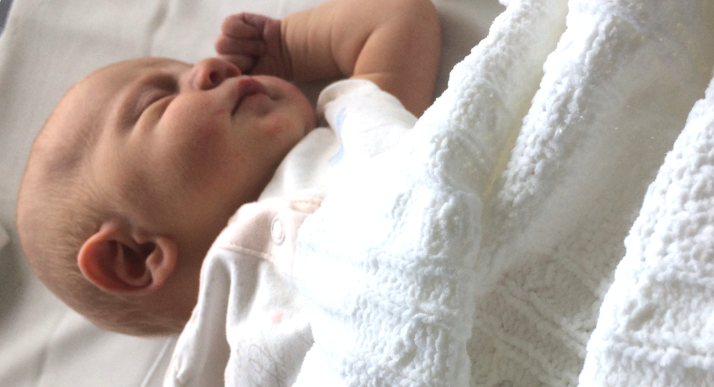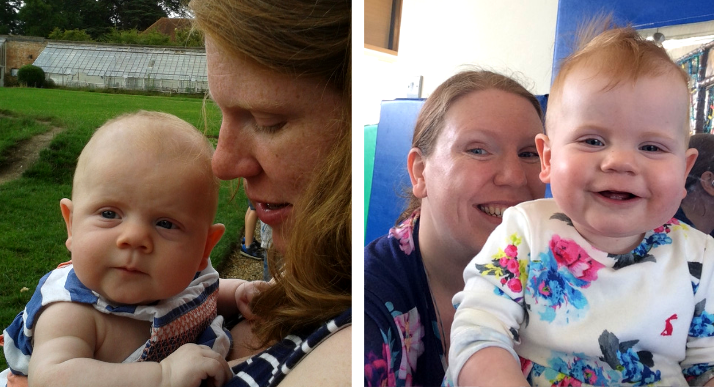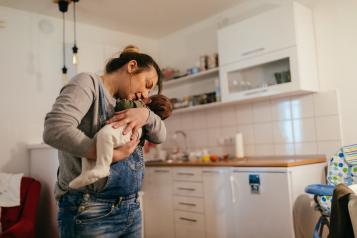Mental health and the journey to parenthood: Rachel’s story
Rachel experienced anxiety and depression throughout her pregnancy and after her baby was born. Because she felt supported to talk about her mental health by her midwife, health visitor and GP, Rachel got the care she needed.
Confident to become a first-time mum
“I first experienced depression as a teenager, but it was never formally diagnosed. A couple of years before I became pregnant, I was feeling low because of work-related stress and pressure, so I decided to speak to my GP.
At my appointment I felt I could be really open about how I was feeling, and after having a few counselling sessions and looking after myself through exercise and healthy eating, I felt happy and confident to become a mum.”
Managing my anxiety
“In the late summer of 2016, I became pregnant. Overall my pregnancy was healthy, but I had a few early scares that I was having a miscarriage. I found the manner of some of the hospital triage midwives to be dismissive. They told me to just take paracetamol but didn’t ask me how I was.
This made me feel very anxious and I became paranoid that I was going to lose the baby, or that I would experience a stillbirth when the baby arrived.
Because I had spoken about my mental health at my first appointment with the midwife, throughout my pregnancy they asked me how I was. This meant if I felt anxious, I had someone to talk to. I felt really supported and reassured by my midwife, so I didn’t feel the need to speak to my GP. I also used the anxiety management techniques I had learned from my counselling sessions, which helped a lot.”

More than just the baby blues
“After the baby was born I struggled to adjust to becoming a new mum. Luckily, I saw the same midwife as I had throughout my pregnancy, and she could see that I had more than just the baby blues.
Part of my low mood was because I was struggling to breastfeed. To help me, the midwife arranged for me to see the maternity support worker, who supported me to start feeding my baby.
Having the same midwife made a huge difference, as I always felt comfortable to share how I was feeling. If I had seen someone new each time, I don’t think I could have opened up about my mental health as easily.”
I had joined a mother and baby group, I was going out and meeting other parents, but behind closed doors I was struggling. I just wasn’t enjoying being a new mum.
Struggling with being a new mum
“Although I was successfully breastfeeding, I still felt down and was constantly very tearful, even though I was doing all the right things. I had joined a mother and baby group, I was going out and meeting other parents, but behind closed doors I was struggling. I just wasn’t enjoying being a new mum.
At six weeks I had an appointment with the health visitor, who after speaking to me about how I was doing, encouraged me to visit my GP to get some support.
Four months after my baby born I made an appointment. I was still comparing myself to other mums and something just wasn’t clicking. I knew I loved my baby, but I still wasn’t connecting with her the way I should have been.”

Getting support
“Because I had spoken to my GP about my mental health before, I knew I could be open about it. I felt really human talking to her.
Initially I was prescribed sertraline for two months, but my GP arranged regular reviews to make sure that the medication and the dosage of it was right for me. I was never made to feel that I was doing anything wrong by needing to take antidepressants and that medication was a normal part of managing my mental health.”
Caring for a toddler
“Now that I have a two-year old, I am adjusting to this stage of my daughter’s life, all while working full-time. Because of the positive experiences I’d had, as soon as I started feeling low again I knew I could talk to my GP and that I would be listened to.
Despite the pressures GPs and the NHS are under, I never felt like I was wasting their time and at no point did I feel that talking about my mental health was something I shouldn’t do.”
The changes Rachel wants to see for other mums
Reducing the stigma so people speak up
“There needs to be reassurance for new parents that there is nothing wrong with you and there is help out there for you if you need it. You don’t have to feel ashamed or judged because of your mental health. You are still you and it is possible to get through it.
I would say to other mums, that there are people out there who care about you and your wellbeing, and they will listen to you.
It was from hearing other people’s positive stories of talking about their mental health, that I felt able to open up about mine.”
Seeing the same person
“I had the same midwife throughout my pregnancy and after my baby was born. This made a huge difference to being able to open up about my mental health.
I would want other people to have the same consistent support.”
More support for partners
“If my husband was unwell he would feel able to go to the GP himself, but it would have to be of his own accord. No services really reached out to him. We were part of a local parent’s group, but even there, the support was all geared to new mums rather than dads.”
Have you been affected by this story?
If the content of this story causes you to think of anything that has happened to you or someone you know and you feel upset, worried or uncomfortable, please see the Maternal Mental Health Alliance's support page for a list of services who may be able to help.


